Horner, Rory, Seth Schindler, Daniel Haberly, and Yuko Aoyama, 2018. “De-globalization and its limits.” Cambridge Journal of Regions, Economy and Society.
Abstract
https://doi.org/10.1093/cjres/rsx026
Horner, Rory, Seth Schindler, Daniel Haberly, and Yuko Aoyama, 2018. “De-globalization and its limits.” Cambridge Journal of Regions, Economy and Society.
https://doi.org/10.1093/cjres/rsx026
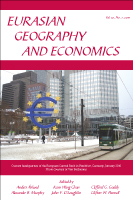 Abstract:
Abstract:
India has emerged as a preferred location for corporate R&D and strategic marketing facilities. Until a decade ago, these functions were conducted almost exclusively near the corporate headquarters of MNEs in the developed world. One reason for the relocation of these functions to India is its changing role as a source of market information. With the saturation of the markets in the developed world, MNEs are increasingly interested in cultivating the bottom-of-the-pyramid market, which makes India an ideal location to collect market knowledge. In this paper, we focus on the emerging relationship between markets and MNEs in India. Drawing on interviews with MNEs in Bangalore, we show how the perception of India as a location of innovation has begun to change, and discuss how India has begun to serve as an ideal location for market knowledge gathering activities by MNEs. We argue that their new orientation offers a window of opportunity that has implications for other developing economies, and conclude that India’s unique combination of market assets have played an important role in enabling MNEs to upgrade their functions.
Aoyama, Yuko and Balaji Parthasarathy. “Research and Development Facilities of Multinational Enterprises in India”, Eurasian Geography and Economics, 53, 6 (2012): 713-730
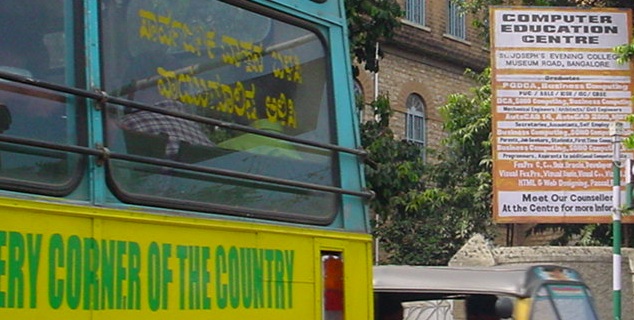
Aoyama, Yuko. Forthcoming. “The IT Industry in Japan: Entrepreneurship and Servicization” P. Cooke and K. O’Connor (eds.), Asia Pacific Information Technology Industry, Routledge.
Aoyama, Yuko. Forthcoming. “Cultural Survival as a Geographic Paradox: The case of Flamenco.” Chapter in Kuhlke, O. and Pine, A. (eds.), Geographies of Dance: Bodies, Space & Movement, Vol.2: Global Movements. Lexington Books: a division of Rowman and Littlefield Publishing Group.
Aoyama, Yuko and Hiro Izushi. Forthcoming. “Video-Game Industry.” Chapter in McCann, et al, (eds.), Handbook of Economic Geography and Industry Studies. Edward Elgar.
Aoyama, Yuko and Rory Horner. 2011. “Service Innovation.” Chapter in Cooke, et al, (eds.), Handbook of Regional Innovation and Growth, Edward Elgar.

“Economic Geography sponsored a workshop to brainstorm collectively the emerging research themes in economic geography. We gathered a small group of midcareer scholars from 19 institutions in 7 countries on April 12–13, 2010, in Washington, D.C., to address what we considered a collective concern: that our discipline could use a significant boost in theoretical and thematic developments at this particular juncture. The workshop was intended to be one of the journal’s many contributions to disciplinary activities and ongoing efforts to keep the discipline vibrant for the next generation. The workshop aimed to achieve multiple goals….” [Read on]
Aoyama, Yuko, 2011. “Teleology, Contexts, and Agency in Sheppard’s Socio-Spatial Ontology” Dialogues in Human Geography 1 (March): 76-79.
Aoyama, Yuko and Rory Horner, 2010. “’World Development Report, 2009’ World Bank.” Book Review. Journal of Regional Science 50 No. 5 (December): 1001-04.
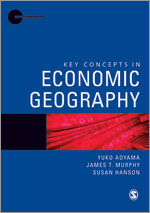
From the Back Cover:
“This book provides a comprehensive and highly readable review of the conceptual underpinnings of economic geography. Students and professional scholars alike will find it extremely useful both as a reference manual and as an authoritative guide to the numerous theoretical debates that characterize the field.” Professor Allen J. Scott, Department of Geography, University of California, Los Angeles, USA
“This book guides readers skillfully through the rapidly changing field of economic geography. It is a highly readable synthesis of contemporary debates within economic geography that is also sensitive to the history of the sub-discipline.” Dr. Sara Hall, School of Geography, University of Nottingham.
Key Concepts in Economic Geography is a new kind of textbook that forms part of an innovative set of companion texts for the Human Geography sub-disciplines. Organized around 20 short essays, Key Concepts in Economic Geography provides a cutting edge introduction to the central concepts that define contemporary research in Economic Geography. The book includes:
– An introductory chapter providing a succinct overview of the recent developments in the field. Read the Introductory chapter, “What is Economic Geography?”
– Over 20 key concept entries with comprehensive explanations, definitions, and evolutions of the subject
– Extensive pedagogic features that enhance understanding including key points, further reading and section introductions.
An ideal companion text for upper-level undergraduate and postgraduate students in Economic Geography, the book presents the key concepts in the discipline, demonstrating their historical roots and contemporary applications to fully understand the processes of economic change, regional growth and decline, globalization, and the changing locations of firms and industries. Written by an international recognized set of authors, the book is an essential addition to any geography student’s library.
Yuko Aoyama, James T. Murphy, and Susan Hanson are all based at Clark University, USA
Independent Reviews provided as comments to the Sage Publications website:
“The nice thing about this text is that it is concise but with depth in its coverage. A must have for any library, and a useful desk reference for any serious student of economic geography or political economy.” – Dr Adam Dixon, School of Geographical Sciences, Bristol University.
“Book presents in a concise way an efficient explanation of a range of core concepts in economic geography. Individual chapters are very useful for undergraduate students to obtain a better grasp of these concepts. A number of these are discussed in tutorials and students are recommended to include chapters from this book as supplemental reading for these tutorials.” – Dr L. Van Grunsven, Faculty of Geosciences, Utrecht University.
“This book provides an excellent introduction into the spatial dimensions of the economy as well as the economic dimensions of space. I have recommended it to students with special interest in the geographical aspects of economic history.” -Professor Ernst Langthaler, Department for Economic and Social History, University of Vienna.
Aoyama, Yuko. 2010. “Manuel Castells”. Warf, B. (ed.), Encyclopedia of Geography. Sage Publications.
Horner, Rory and Yuko Aoyama. 2009. “Limits to FDI-driven growth in Ireland: A newspaper content analysis for investment, upgrading and divestment.” In P. Kirby and P. Carmody (eds.), The Legacy of Ireland’s Economic Expansion: Geographies of the Celtic Tiger. Taylor & Francis, pp.140-160.
Aoyama, Yuko, 2009. “Consumption-centered research for diverse urban economies.” Urban Geography 30 No.4: 1-3.
Aoyama, Yuko. 2009. “Entrepreneurship and Regional Culture: The case of Hamamatsuand Kyoto, Japan.” Chapter in Yeung, H. (ed.), Globalizing Regional Development in Asia. Taylor & Francis.
Horner, Rory and Yuko Aoyama. 2009 “Limits to FDI-driven growth in Ireland: A newspaper content analysis for investment, upgrading and divestment.” Irish Geography 42 No. 2 (July): 187-207.
Aoyama, Yuko, 2009. “Entrepreneurship and Regional Culture: The case of Hamamatsuand Kyoto, Japan.” Regional Studies 43 No.3 (April): 495-512.
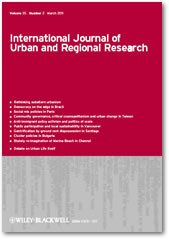 Abstract
Abstract
In this article, I seek to demonstrate how research on cultural industries and tourism combined yields insights into the contemporary dynamics of cultural survival in the age of globalization. Tourism is increasingly an important economic force that facilitates cultural mobility and promotes cultural consumption, and in turn contributes to the growth of a regionally embedded cultural industry. I take the example of flamenco music and dance in southern Spain and focus on three agents that help shape this art complex — the cultural industry, the tourists and the state. I analyze how these agents interact, and show how their engagements at multiple geographic scales result in a distinctive and successful cultural tourism in Seville, Andalusia. The flamenco art complex survives and thrives today through the combination of resilient local talent closely linked to identity maintenance, domestic and foreign tourists that engage in cultural consumption, and the government subsidizing the artists through state‐sponsored spectacles.
Aoyama, Yuko. 2009. “Artists, Tourists, and the State: Cultural Tourism and the Flamenco Industry in Andalusia, Spain.” International Journal of Urban and Regional Research 33 No. 1 (March): 80-104.

Aoyama, Yuko, 2009. “‘Services and Economic Development in the Asia-Pacific’ Daniels and Harrington, editors” Book Review. Annals of the Association of American Geographers.99 No.1 (January): 221-223.
Ratick, Samuel, Brian Meecham and Yuko Aoyama. 2008. “Locating Backup Facilities to Enhance Supply Chain Disaster Resilience.” Growth and Change 39, 4 (December): 642-666.
Aoyama, Yuko and Hiro Izushi, 2008. “User-innovation in the video game industry.” DIME Working Paper. Available at http://www.dime-eu.org/files/active/0/AoyamaIzushiPAPER.pdf
Aoyama, Yuko and Samuel Ratick. 2007. “Competition and Inter-firm Relations in the Age of Instant Access: Case of the U.S.Logistics Industry.” Chapter in Miller, H. (ed.) Societies and Cities in the Age of Instant Access. Springer, pp.311-327.
Aoyama, Yuko. 2007. “Oligopoly and the Structural Paradox of Retail TNCs: An Assessment of Carrefour and Wal-Mart in Japan.” Journal of Economic Geography, 7 (July): 471-490.
Aoyama, Yuko and Samuel Ratick. 2007. “Trust, Transactions, and Inter-firm Relations in the U.S.Logistics Industry.” Economic Geography 83 No.2 (April): 159-180.
Aoyama, Yuko. 2007. “The Role of Consumption and Globalization in a Cultural Industry: The Case of Flamenco.” Geoforum 38 No.1: 103-113.
Izushi, Hiro and Yuko Aoyama. 2006. “Industry Evolution and Cross-Sectoral Skill Transfers: A Comparative Analysis of the Video Game Industry in Japan, the United States, and the United Kingdom.” Environment and Planning A 38 No.10 (October): 1843-1861.
Aoyama, Yuko and Guido Schwarz. 2006. “The Myth of Wal-Martization: Retail Globalization and Local Competition in Japan and Germany.” Chapter in Brunn, S. (ed.) Wal-Mart World. New York: Routledge, pp. 275-291.
Aoyama, Yuko, Samuel J. Ratick and Guido Schwarz. 2006. “Organizational Dynamics of the U.S.Logistics Industry from an Economic Geography Perspective.” The Professional Geographer 58 No.3 (August): 327-340.
Parthasarathy, Balaji and Yuko Aoyama. 2006. “From Software Services to R&D Services: Local entrepreneurship in the software industry in Bangalore, India.” Environment and Planning A 38 No. 7 (July): 1269-1285.
Aoyama, Yuko, Samuel J. Ratick and Guido Schwarz. 2005. “Modeling the Impacts of Business-to-Business Electronic Commerce on the Organization of the Logistics Industry.” Geographical Analysis 37 No.1: 46-68
Aoyama, Yuko. 2005. “Retail and Distribution in the Information Age: A Research Agenda for Economic Geography.” Annals of the Japanese Economic Geographers 51 No.1: 101-115
Aoyama, Yuko and Guido Schwarz. 2004. “From Mail Order to E-Commerce: Competition, Regulation, and Politics of Non-store Retailing in Germany.” Urban Geography 25 No.6: 503-527.
Aoyama, Yuko and Hiro Izushi, 2004, “Creative Foundations of the Japanese Video Game Industry.” Chapter in D. Power and A. J. Scott (eds.) Cultural Industries and the Production of Culture, London and New York: Routledge, pp.110-129.
Zook, Matthew, Martin Dodge, Yuko Aoyama and Anthony Townsend, 2004. “New Digital Geographies: Information, Communication, and Place.” Chapter in S. Brunn, S. Cutter and J.W. Harrington (eds.), Geography and Technology. Kluwer Academic Publishers, pp.155-176.
Aoyama, Yuko, 2003, “E-Commerce and Urban Space in Japan: Accessing the Net via Convenience Stores and Mobile Telephones” Chapter in Cybercities Reader edited by Stephen Graham,London and New York, Routledge, pp.231-234.
Aoyama, Yuko, 2003. “Socio-Spatial Dimensions of Technology Adoption: Recent E- and M-Commerce Developments.” Environment and Planning A 35 No. 7: 1201-1221
Aoyama, Yuko and Eric Sheppard, 2003. “Introduction to the Special Issue, The Dialectics of Geographic and Virtual Spaces.” Co-guest editor for the Special issue. Environment and Planning A 35 No.7: 1151-1156
Aoyama, Yuko. 2003. “Theorizing Globalization: Prospective for Economic Geography.” Annals of the Japanese Economic Geographers 49 No.5: 467-481.
Aoyama, Yuko, 2003. “Globalization of Knowledge-Intensive Industries: The case of software production in Bangalores, India” Annual Report of Research Center for Regional Studies (ANREG) 12: 33-50.
Aoyama, Yuko and Hiro Izushi, 2003. “Hardware Gimmick or Cultural Innovation?: Technological, cultural, and social foundations of the Japanese video game industry.” Research Policy 32 No.3: 423-444.
Aoyama, Yuko and Manuel Castells, 2002. “An Empirical Assessment of the Informational Society: Employment and Occupational Structures of G-7 Countries.” International Labour Review 141 No. 1-2: 123-159.
Aoyama, Yuko, 2002. ‘Mapping Globalization – Hargittai, and Centeno.” Book Review. Annals of the Association of American Geographers 92 No.3 (September): 589-592.
Aoyama, Yuko, 2001. “Structural Foundations for Electronic Commerce: A Comparative Organization of Retail Trade in Japanand the United States.” Urban Geography 22 No.2: 130-153.
Aoyama, Yuko, 2001. “The Information Society, Japanese Style: Corner Stores as Hubs for E-Commerce Access.” Chapter in Worlds of Electronic Commerce, edited by Stanley D. Brunn and Thomas R. Leinbach. Chichester: John Wiley, pp.109-128.
Aoyama, Yuko, 2001. “Globalization and the Asia-Pacific – Olds, Dicken, Kelly, Kong, and Yeung.” Book Review. Economic Geography 77 No.2 (April): 201-202.
Wheeler, James O., Yuko Aoyama and Barney Warf, eds., 2000. Cities in the Telecommunications Age: The Fracturing of Geographies. New York: Routledge.
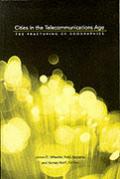
“By any measure, Cities in the Telecommunications Age is a landmark contribution to urban studies. This outstanding collection by cutting-edge researchers offers the most comprehensive and sophisticated interpretation to date of the economic and social transformations that are reshaping urban spatial organization.” — Peter O. Muller, Professor of Geography, University of Miami
“These essays, authored by a group of prominent senior scholars and promising young researchers, are both insightful and stimulating. I expect this timely book to become an important reference for students and researchers in geography and in city and regional planning.” — Qing Shen, Associate Professor, Department of Urban Studies and Planning, Massachusetts Institute of Technology
“Cities in the Telecommunications Age presents a very wide-ranging and balanced scope on cities and telecommunications. Refreshingly, it includes empirical studies on various related aspects. The book is a must for scholars focusing on cities in pertinent disciplines, as well as students of telecommunications in the social sciences.” — Aharon Kellerman, Professor and Vice-President, University of Haifa
“Cities in the Telecommunications Age is a timely and important contribution to our understanding of a revolution with yet uncertain destinations. Experiences of cities in the United States and the United Kingdom and research findings in these countries offer informed comparisons and guideposts to human futures at the dawn of a new century.” — Donald G. Janelle, Professor Emeritus, Department of Geography, University of Western Ontario
Aoyama, Yuko, 2000. “Industrial Network Formation and Regulation: The Case of Japan’s SME Policy.” Chapter in Network Firms in the Global World: Small Firms in New Environments. Edited by Eirik Vatne and Michael Taylor. Aldershot: Ashgate, pp.45-63.
Wheeler, James O., Yuko Aoyama and Barney Warf, 2000. “Introduction”. Fractured Geographies: Cities in the Telecommunication Age. New York: Routledge, pp.3-17.
Aoyama, Yuko, 2000. “Keiretsu, Networks and Locations of Japanese Electronics Industry in Asia.” Environment and Planning A 32 No. 2 (February): 223-244.
Aoyama, Yuko, 1999. “Exclusion and Empowerment for Real and Virtual Communities.” Guest Editor for the special issue, Cities and the Telecommunications at Millennium’s End in Urban Geography 20 No.4, 291-293.
Aoyama, Yuko, 1999. “Locational Dynamics of Japanese Electronics Industry in Europe.” Chapter in FDI and the Global Economy: Corporate and Institutional Dynamics of Global-Localization, edited by Nicholas Phelps and Jeremy Alden. Published in Association with the Regional Studies Association,London: Stationery Office, pp103-119.
Aoyama, Yuko, 1999. “Policy Interventions for Industrial Network Formation: Contrasting Historical Underpinnings of the Small Business Policy in Japan and the United States.” Small Business Economics 12 No.3 (May): 217-231.
Aoyama, Yuko, 1998. “Cutting Edge: Technology, Information, Capitalism and Social Revolution – Davis, Hirschl and Stack.” Book Review. AREA 30 No.4 (December): 380-381.
Castells, Manuel and Yuko Aoyama, 1998. “Paths Towards the Informational Society: Employment Structure in G-7 Countries. 1920-1990.” Reprinted. Chapter in J. R. Bryson and P.W. Daniels (eds.). Service Industries in the Global Economy. The International Library of Critical Writings in Economics, an Elgar Reference Collection. Cheltenham, Glos.: Edward Elgar, Vol. 1, pp. 525-553.
Aoyama, Yuko, 1997. “Institutional Environment for Business Start-ups: Small Business Policy and Venture Capital in the United States.” In Moglichkeiten zur Verbesserung des wirtschafts- und gesellschaftspolitischen Umfeldes fur Existenzgrunder und kleine und mittlere Unternehmen – Wege zu einer neuen Kultur de Selbstandigkeit. Max Planck Institute and Rheinisch Westfaelishcen Institute for Economic Research, Germany, pp.53-87.
Aoyama, Yuko, 1997. “Integrating Business and Location: An Overview of Two Theoretical Frameworks on Multinational Firms.” Berkeley Planning Journal 11: 49-70.
Castells, Manuel and Yuko Aoyama, 1997. “Paths Towards the Informational Society: Employment Structure in G-7 Countries. 1920-1990.” Reprinted (with Manuel Castells). Chapter in Van den Berg, Axel and Joseph Smucker (eds.). The Sociology of Labour Markets: Efficiency, Equity, Security. Scarborough, Ontario, Prentice Hall, pp.14-39.
Aoyama, Yuko, 1997. “The Location of Foreign Direct Investment: Geographic and Business Approaches — Green and McNaughton.” Book Review. The Professional Geographer 49 No. 3 (August): 377-378.
Aoyama, Yuko and Michael B. Teitz, 1996. Small Business Policy in Japan and the United States: A Comparative Analysis on Objectives and Outcomes. Policy Papers in International Affairs 44 Institute of International Studies, University of California at Berkeley.
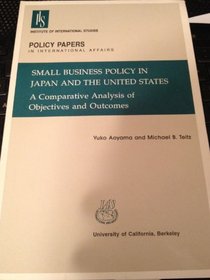
Aoyama, Yuko, 1996. “Local Economic Development or National Industrial Strategy: Recent Trends in Small Business Policy in Japanand the United States.” Review of Urban and Regional Development Studies. 8 No.1 (January): 1-14.
Castells, Manuel and Yuko Aoyama, 1994. “Paths Towards the Informational Society: Employment Structure in G-7 Countries. 1920-1990.” International Labour Review 133, No.1: 5-33.
Castells, Manuel and Yuko Aoyama, 1993. Paths Towards the Informational Society: A Comparative Analysis of the Transformation of Employment Structure in the G-7 Countries, 1920-2005. (with Manuel Castells). Working Paper No. 61,Berkeley Roundtable on the International Economy,University of California,Berkeley, March.
Cohen, Stephen, Yuko Aoyama, Lisa Bornstein and Brian Muller, 1992. Analisis de Distinas Experiencias Europeas de Reindustrializacion y Reactivacion de Regiones de Cuencas Mineras Ligadas a la Industria Siderometalurgica asi como Formulacion de Recomenadaciones de Estrategias de desarrollo y de Inversion. Wales, Nord-Pas-de-Calais, Wallonias & Ruhrgebiet. Commissioned Report to the Governor of Asturias, Spain. Vols. I-V. San Francisco: Industry and Trade Strategies, December
Alexandre, Ariel and Yuko Aoyama, 1992. “Toshi to Koreisha.” (translated). The OECD Observer, 1992/8, 177,Tokyo: Nihon keizai chosa kyogikai (November).
Aoyama, Yuko, 1992. “Socio-demographic Trends and Elderly Populations in OECD Countries.” Chapter in Urban Policies for Ageing Populations, OECD, Paris, pp.19-42.
Alexandre, Ariel and Yuko Aoyama, 1992. “Cities and the Elderly.” (with Ariel Alexandre) The OECD Observer, OECD, Paris, (August/September), pp. 9-11
Fox-Przeworski, Joanne and Yuko Aoyama, 1990. Urban Policies for Ageing Populations: Major Findings and Policy Options. Document for General Distribution, OECD, Paris.
Aoyama, Yuko, 1989. Synthesis and Analysis of Socio-demographic Statistics: Ageing Populations of OECD Countries. Restricted Document, Group of Urban Affairs, OECD, November.
Ong, Paul, Yuko Aoyama, Glen Kitayama and Paul Schmek, 1989. California‘s Asian Population: Past Trends and Projections for the Year 2000. Los Angeles,Calif.:Graduate School of Architecture and Urban Planning, and Asian American StudiesCenter,University of California, Los Angeles.
Aoyama, Yuko, 1989. Comparative Socio-demographic Trends: Initial Data on Ageing Populations of OECD Countries. Restricted Document, the Group of Urban Affairs, OECD, April.